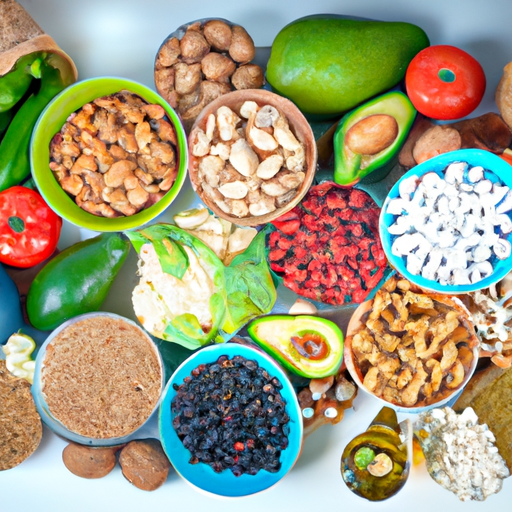In this article, we will explore whether the Keto diet has any side effects or risks. We will discuss the potential impact on your body and what you need to be aware of if you are considering starting this diet. By the end, you’ll have a clear understanding of the potential risks and side effects associated with the Keto diet.
What is the Keto Diet
The Keto diet, short for ketogenic diet, is a low-carb, high-fat eating plan that has gained popularity in recent years. This diet involves drastically reducing carbohydrate intake and replacing it with fat. The goal is to put the body in a state of ketosis, where it relies on fat for energy instead of carbohydrates. This shift in fuel source can lead to a variety of health benefits, but it is also important to consider the potential side effects and risks associated with this diet.
Explanation of the Keto Diet
The Keto diet is designed to mimic the effects of fasting on the body. By reducing carbohydrate intake, the body is forced to use stored fat as its primary source of energy. This process leads to the production of ketones, which are molecules that the body can use for fuel. The Keto diet typically consists of 70-75% fat, 20-25% protein, and 5-10% carbohydrates. This macronutrient distribution is very different from the standard Western diet, which is high in carbohydrates and low in fat. The Keto diet focuses on consuming foods rich in healthy fats, such as avocados, nuts, and olive oil, while avoiding foods high in carbohydrates, such as bread, pasta, and sugary snacks.
Are You a Ketosis Master? Take Our Quiz!
How the Keto Diet Works
When you follow the Keto diet, your body enters a state called ketosis. In this state, your liver starts to break down fat into ketones, which are then used as fuel by the body and the brain. By restricting carbohydrates, you are essentially forcing your body to rely on fat for energy instead of glucose derived from carbs. This shift in fuel source can lead to weight loss and other positive metabolic changes.
Benefits of the Keto Diet
There are several potential benefits associated with the Keto diet:
-
Weight Loss: The Keto diet has been shown to be effective for weight loss, as it promotes the burning of stored body fat.
-
Blood Sugar Control: By limiting carbohydrate intake, the Keto diet may help stabilize blood sugar levels, especially for individuals with diabetes or pre-diabetes.
-
Increased Energy: Many individuals report increased energy levels while on the Keto diet, as the body becomes efficient at using fat for fuel.
-
Improved Mental Clarity: Some people following the Keto diet claim to experience enhanced mental focus and clarity.
-
Reduced Inflammation: The Keto diet has been shown to reduce markers of inflammation in the body, which may have positive effects on overall health.
While these benefits are encouraging, it is essential to understand that the Keto diet is not suitable for everyone and may carry some side effects and risks.
Potential Side Effects of the Keto Diet
-
Keto Flu: The transition into ketosis can cause flu-like symptoms, such as fatigue, dizziness, nausea, and headaches. This is commonly referred to as the “Keto flu” and usually subsides after a few days to a week.
-
Digestive Issues: Some people may experience digestive issues, such as constipation or diarrhea, due to the changes in dietary fiber intake when following the Keto diet.
-
Nutritional Deficiencies: Since the Keto diet restricts many food groups, it can be challenging to meet all the essential nutrient needs. It is crucial to ensure a varied and well-balanced diet to avoid deficiencies in vitamins, minerals, and fiber.
-
Muscle Loss: When carbohydrates are limited, the body may break down muscle tissue to use as an alternative energy source. To prevent muscle loss, it is important to prioritize adequate protein intake on the Keto diet.
-
Heart Disease Risk: The Keto diet typically includes foods high in saturated fats, such as bacon and butter. While some studies suggest that saturated fat may not be as harmful as previously believed, it is still important to choose sources of fat that are heart-healthy, such as nuts, seeds, and olive oil.
Common Risks of the Keto Diet
-
Yo-yo Dieting: The Keto diet, like any other restrictive diet, may lead to weight cycling or yo-yo dieting. This can have negative effects on metabolism and may make long-term weight management more challenging.
-
Restrictive Eating: The strict nature of the Keto diet may lead to a restricted food intake and limited food choices, which can negatively impact enjoyment of food and social experiences.
-
Lack of Sustainability: The Keto diet can be challenging to sustain long-term due to its restrictive nature. It is important to consider whether the diet is compatible with your lifestyle and if you can maintain it over an extended period.
-
Disordered Eating Patterns: Restrictive diets like Keto may increase the risk of developing disordered eating patterns, such as obsessive thoughts about food, extreme restriction, or binge eating episodes. It is important to be mindful of your mental and emotional well-being when following any diet.
Management and Minimization of Side Effects
To minimize and manage the potential side effects of the Keto diet, consider the following strategies:
-
Gradual Transition into Ketosis: Instead of jumping into a strict Keto diet overnight, consider gradually reducing carbohydrate intake to allow your body to adjust.
-
Balanced Macronutrient Intake: While the Keto diet is high in fat, it is important to include an adequate amount of protein and consume a variety of low-carb vegetables to meet your nutrient needs.
-
Adequate Hydration: Drink plenty of water throughout the day to stay hydrated and help flush out ketones and prevent constipation.
-
Supplementation: Consider adding supplements, such as electrolytes or fiber, to address any potential nutrient deficiencies and support overall health.
-
Regular Monitoring and Adjustments: Pay attention to your body’s response to the Keto diet and make adjustments as needed. Consult with a healthcare professional for guidance and regular health check-ups.
Consulting with a Healthcare Professional
It is crucial to consult with a healthcare professional, such as a registered dietitian or your primary care physician, before starting any new diet or making significant dietary changes. They can provide personalized advice based on your individual health and medical history.
-
Importance of Medical Advice: A healthcare professional can help determine if the Keto diet is appropriate for you, considering any underlying medical conditions or medications you may be taking.
-
Individualized Approach: Every person is different, and what works for one may not work for another. A healthcare professional can help tailor the Keto diet to your specific needs and goals.
-
Monitoring Health Markers: Regular monitoring of bloodwork and other health markers can help ensure that the Keto diet is not negatively impacting your overall health.
-
Professional Guidance on Risks: A healthcare professional can provide accurate information about potential risks and help you make an informed decision about whether the Keto diet is suitable for you.

Considerations for Specific Individuals
-
Existing Medical Conditions: Individuals with certain medical conditions, such as liver or pancreatic disorders, may need to avoid or modify the Keto diet. It is important to consult with a healthcare professional to determine the best course of action.
-
Medication Interactions: Some medications, such as diabetes medications or anticoagulants, may interact with the Keto diet. A healthcare professional can provide guidance on adjusting medication dosages or monitoring for potential interactions.
-
Pregnancy and Breastfeeding: The Keto diet is not recommended during pregnancy and breastfeeding due to the potential risks associated with nutrient deficiencies. It is important to prioritize a well-balanced diet during this time.
-
Athletes and High-Intensity Exercisers: Individuals engaged in intense physical activity may need to modify the Keto diet to ensure adequate energy and nutrient intake. Consultation with a healthcare professional or sports nutritionist can help create an appropriate eating plan.
Long-term Effects and Research
While short-term studies have shown potential benefits of the Keto diet, there is limited research on the long-term effects and sustainability of this eating plan. It is important to approach the Keto diet with caution and consider whether it is a sustainable option for your long-term health and well-being.
-
Limited Long-term Studies: Long-term studies on the effects and safety of the Keto diet are lacking. The potential risks and benefits of following this diet for an extended period are still being explored.
-
Potential Impact on Metabolism: Some evidence suggests that the Keto diet may have effects on metabolic health, such as changes in insulin sensitivity and lipid profiles. Further research is needed to fully understand these potential impacts.
-
Weight Regain after Discontinuing: Like many other diets, weight regain can occur once the Keto diet is discontinued. It is important to focus on long-term sustainable lifestyle changes rather than relying on short-term diets for weight management.

Alternative Diets and Approaches
While the Keto diet has gained popularity, it is not the only approach to improve health or achieve weight loss. It is important to consider alternative diets and approaches that may be more sustainable or better suited to your specific needs.
-
Low-carb Diets: Low-carb diets, such as the Atkins diet, focus on reducing carbohydrate intake but may allow for a slightly higher carbohydrate allowance compared to the Keto diet. These diets may be more flexible and easier to sustain long-term.
-
Mediterranean Diet: The Mediterranean diet is a balanced eating plan that emphasizes whole, unprocessed foods, healthy fats, lean proteins, and abundant fruits and vegetables. It has been extensively researched for its positive effects on overall health.
-
Plant-Based Diets: Plant-based diets, such as vegetarian or vegan diets, can provide a wide range of nutrients while being lower in saturated fat. These diets can be a healthy alternative to the Keto diet for individuals looking to improve their health or reduce their environmental impact.
-
Intermittent Fasting: Intermittent fasting involves alternating periods of fasting and eating. This approach can be combined with various eating plans, including low-carb diets, to potentially enhance fat burning and improve metabolic health.
Conclusion
When considering embarking on the Keto diet, it is important to weigh the potential benefits and risks associated with this eating plan. While the Keto diet may offer weight loss and metabolic benefits for some individuals, it can also come with potential side effects and risks. Consulting with a healthcare professional is essential to determine if the Keto diet is suitable for you and to receive individualized guidance. It is also crucial to consider alternative diets and approaches that may offer similar benefits but with fewer potential risks. Ultimately, making informed decisions and monitoring your personal health are key to achieving your health and wellness goals.



